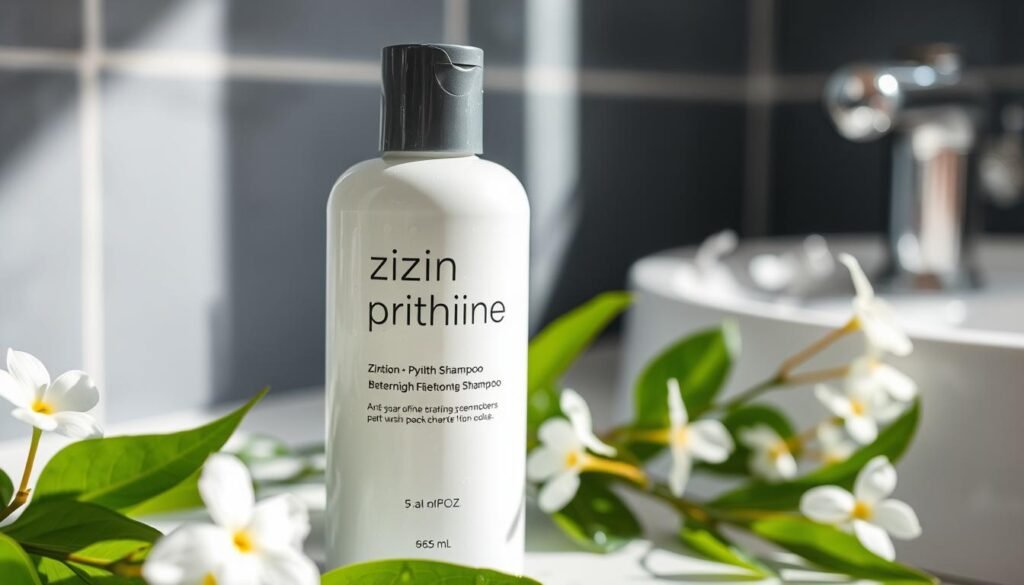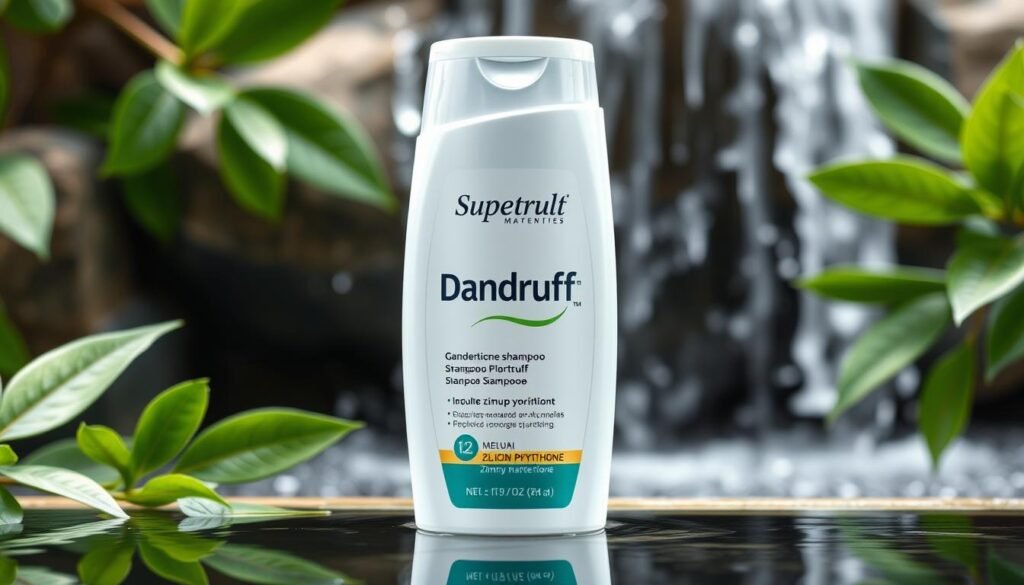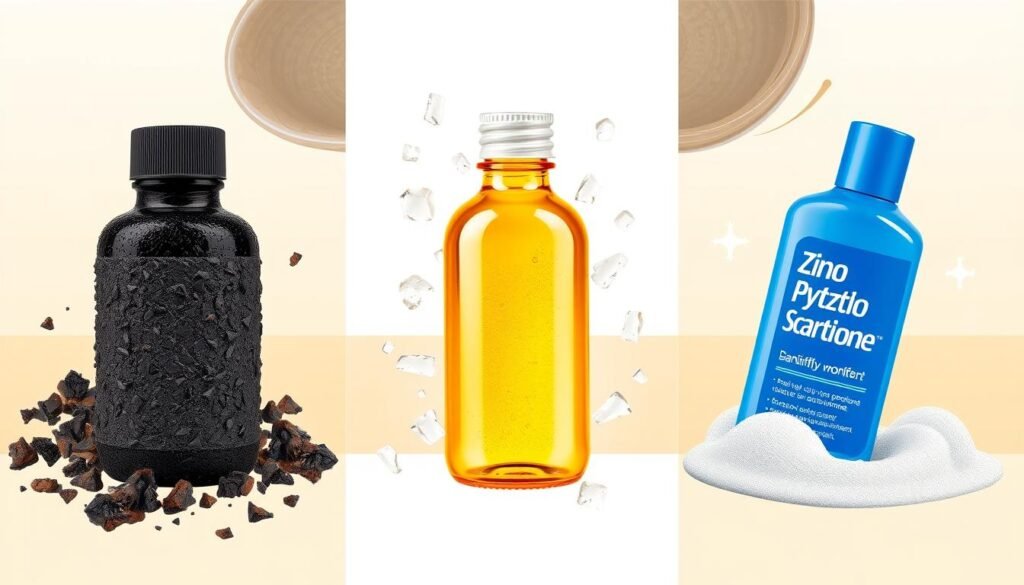Did you know nearly 50% of adults face dandruff during their lives? This scalp issue may cause itching and flaking, making people uncomfortable. Luckily, Zinc Pyrithione (ZPT) is a strong solution against these problems. It attacks the causes of dandruff and offers effective, lasting relief unlike many other treatments.
We’re going to look at how Zinc Pyrithione stands out for controlling dandruff. It has solid support from science for improving scalp health. By choosing ZPT-based items like Head & Shoulders shampoos, you can fight itchy scalps and prevent new dandruff issues.
Also, a good hair care routine can boost Zinc Pyrithione results. You’ll get all the details you need to manage dandruff effectively here. Read on!
Key Takeaways
- Zinc Pyrithione effectively controls dandruff by targeting the yeast responsible for the condition.
- Regular use of ZPT shampoo can lead to a significant reduction in dandruff after just a few washes.
- A majority of individuals do not need prescription-strength products for effective dandruff treatment.
- Rotating between different types of dandruff shampoos can maintain their effectiveness over time.
- Adopting a healthy lifestyle can complement topical treatments for dandruff control.
Understanding Dandruff and Its Causes
Dandruff is a common scalp issue that affects many people before they become adults. It doesn’t matter who you are; it can happen. However, it’s often wrongly believed to just be due to not keeping clean. In fact, it’s caused by several factors including biology and environment.
Common Misconceptions About Dandruff
Many think dandruff is all about not washing enough. But, it’s not so simple. While keeping the scalp clean helps, the real issue often ties back to Malassezia yeast. This yeast loves oily places and feeds on the oils our bodies make.
Things like not eating right, using harsh hair products, and feeling stressed can make dandruff worse. So, it’s about more than just shampooing your hair.
Role of Malassezia Yeast in Dandruff Formation
The Malassezia yeast is key in why dandruff happens. When dandruff shows up, this yeast’s numbers jump up. The increase in yeast leads to more skin cells falling off.
Knowing how this yeast works helps in finding treatments that work. For example, zinc pyrithione can really help in reducing the yeast. This makes the scalp healthier. For more info, check these research articles.
Individual Susceptibility Factors
Why some get dandruff varies. Your genes, how your body defends itself, and how oily your skin is all matter. For instance, people with oily skin or those under a lot of stress might see more dandruff. This shows how our bodies and minds affect our scalp health.
What is Zinc Pyrithione?
Zinc Pyrithione is a well-known antifungal agent. It is effective in treating dandruff. This substance slows down fungus growth on the scalp, which is often the cause of dandruff and related scalp issues.
Chemical Composition and Properties
The chemical structure of Zinc Pyrithione helps deliver zinc ions. This increases cellular zinc levels where Malassezia yeast is common. It’s a popular choice in dandruff shampoos not just for its antifungal action but also for its antimicrobial properties.
These properties also help reduce inflammation and irritation caused by dandruff.
History and Development as a Dandruff Treatment
Zinc Pyrithione comes from Aspergillus flavus and has been used in antifungal treatments since the mid-20th century. You can find it in dandruff shampoos, like Head & Shoulders. It is used to treat seborrheic dermatitis and scalp psoriasis.
Studies show that 1% to 2% Zinc Pyrithione can greatly lessen dandruff symptoms. This includes reducing redness and scalp irritation.
Zinc Pyrithione is not just for dandruff. It also helps with facial seborrheic dermatitis. Being available over-the-counter, it’s easy to find at drugstores and supermarkets. While side effects are rare, it’s best to talk to a healthcare professional if adverse reactions occur.
Starting with up to five uses a week is recommended, decreasing as the situation gets better. Pregnant or nursing women especially should seek expert advice before starting this or any new treatment.
In-depth information about Zinc Pyrithione can be found here
Zinc Pyrithione for Dandruff Treatment
Zinc Pyrithione is popular in anti-dandruff products. It fights dandruff in several ways. By targeting Malassezia yeast, a common cause of dandruff, it works at the root of the problem. Knowing how it works can make people see the value of using it for their scalp.
Mechanism of Action Against Malassezia
Zinc Pyrithione’s antifungal features make it great against dandruff. It increases zinc inside cells, stopping Malassezia’s energy production. Reducing the yeast’s lipase expression, it weakens its survival. This control over Malassezia helps keep dandruff away.
Effects on Scalp Microbial Balance
Zinc Pyrithione also helps balance scalp microbes. A balanced scalp means less dandruff and irritation. It lowers Malassezia levels, fostering a healthier scalp environment. Studies report less redness and flaking with its use. Users are really happy with the results, showing its worth for scalp health.

How to Use Zinc Pyrithione Products
Using Zinc Pyrithione Products can really help with hair care, especially with dandruff. It’s important to pick the right dandruff shampoo for the best results.
Choosing the Right Dandruff Shampoo
When looking for a dandruff shampoo, make sure it has at least 1% Zinc Pyrithione. This fights dandruff well. The DHS Zinc Shampoo is a great choice with 2% Zinc Pyrithione. It does more than just tackle dandruff; it also eases itching and swelling.
If you have serious scalp issues, think about using other products too. For instance, the DHS SAL Shampoo with 3% Salicylic Acid is great for psoriasis and seborrheic dermatitis.
Application Techniques for Maximum Effectiveness
To get the best results, apply the shampoo the right way. It should go on a wet scalp and be massaged gently. Let it sit for 3-5 minutes to work against dandruff-causing yeast. Then, using a DHS Conditioning Rinse can help keep your hair healthy while using Zinc Pyrithione.
Try using these shampoos 3-4 times a week, or as a skin doctor suggests. Using them too much can dry out your scalp.

Incorporating these steps into your hair care can effectively control dandruff and boost scalp health. For more on spotting dandruff symptoms, check out this informative article.
Comparison with Other Dandruff Treatments
Looking into dandruff treatment options is important. Knowing how different ingredients work helps you find the best solution. Coal Tar and Salicylic Acid are two major alternatives to Zinc Pyrithione for dandruff. Each treatment acts differently and has unique benefits.
Coal Tar vs. Zinc Pyrithione
Coal Tar is often found in dandruff shampoos. It helps ease scalp irritation. However, it can’t stop the cause of the irritation, leading to possible symptom return. Also, long-term use might change your hair color. On the other hand, Zinc Pyrithione fights the yeast causing dandruff, offering a more direct attack.
Salicylic Acid as an Alternative Treatment
Salicylic Acid is another option for fighting dandruff. It’s good at exfoliating the scalp and removing flakes. But, it doesn’t get to the dandruff’s root cause. Zinc Pyrithione, in contrast, can reduce both scalp irritation and flaking, providing a more complete solution.
| Treatment | Primary Effect | Mechanism of Action | Considerations |
|---|---|---|---|
| Coal Tar | Reduces irritants | Suppresses skin cell turnover | Can discolor hair; does not prevent irritant production |
| Zinc Pyrithione | Targets Malassezia | Antifungal properties | Effective in long-term management |
| Salicylic Acid | Exfoliates flakes | Promotes shedding of dead skin cells | Limited against root causes; may require combination |

The Benefits of Using Zinc Pyrithione
Zinc pyrithione helps those with scalp problems. It eases discomfort and boosts scalp health. Its strength and care come together for great support.
Effective Itchy Scalp Relief
Zinc pyrithione is great for quick itchy scalp relief. In shampoos, it fights the causes of irritation, like the Malassezia yeast. It’s antibacterial and antifungal, reducing inflammation and itchiness fast.
Addressing Flaky Scalp Issues
For problems with a flaky scalp, zinc pyrithione products are key. They slow down skin cell growth and cut yeast production. This fights a major cause of dandruff, reducing flakes for a clean look.
Long-Term Scalp Care Advantages
Using zinc pyrithione every day is great for long-term scalp care. It fights inflammation, treating issues and preventing new ones. Over time, it turns a troubled scalp into a healthy area, which is better for hair growth and texture.
Clinical Evidence Supporting Zinc Pyrithione
Zinc Pyrithione is known for its power to fight dandruff. Studies have tested its safety and effectiveness. They prove it’s good for scalp health.
Studies on Efficacy and Safety
Using a shampoo with 1% Zinc Pyrithione can reduce dandruff noticeably after nine washes. It did better than placebo shampoos in a three-week study. Clinical evidence confirms its ability to control dandruff, thanks to its antimicrobial and antifungal qualities. The SCCS agrees it’s safe for cosmetics, like shampoos.
Real-World User Experiences and Satisfaction
People love Zinc Pyrithione shampoos for beating dandruff. They see a big difference in their scalp’s health. A healthy scalp means more self-confidence and no flakes. Jupiter’s shampoos do a great job without needing a doctor’s note.
Potential Side Effects and Precautions
Zinc Pyrithione is seen as safe and works well against dandruff for most. However, some might face mild reactions. These reactions include skin irritation, dryness, and a burning feeling. It’s key to watch how one reacts to the treatment.
Mild Reactions vs. Severe Allergic Responses
In rare cases, severe allergic reactions to Zinc Pyrithione can happen. These reactions need quick medical help. Symptoms can be a widespread rash, severe itching, or breathing problems. It’s smart for people with allergies to fungi to talk to a skin doctor before starting treatment. Following directions and watching for strange signs can lower risks.
When to Consult a Dermatologist
If there’s no improvement or the condition gets worse, seeing a dermatologist is important. Keep an eye out for ongoing irritation or other issues. It’s advised to tell a doctor about any bad effects. To report side effects, call the FDA at 1-800-FDA-1088. This helps keep consumer safety a top concern in dandruff care.